May 19, 2025 | 23:40 GMT +7
May 19, 2025 | 23:40 GMT +7
Hotline: 0913.378.918
May 19, 2025 | 23:40 GMT +7
Hotline: 0913.378.918
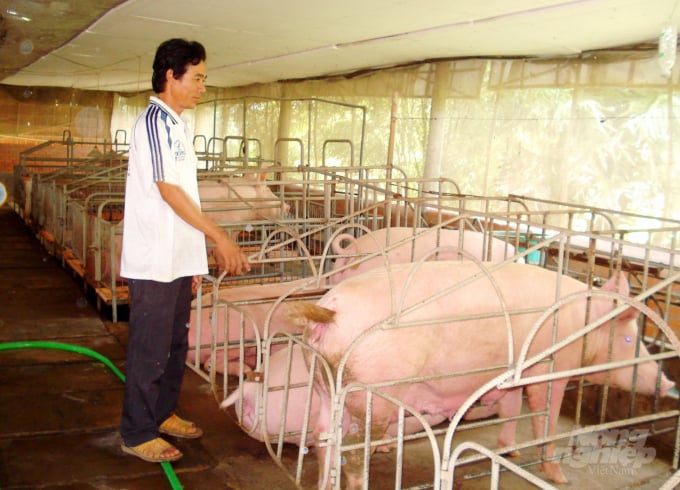
With the current selling price, pig farmers lose at least VND 1.4-1.5 million per head. Photo: Le Hoang Vu.
On October 19, the price of a live pig in Mekong Delta provinces ranged between VND 37,000 and 38,000 and continued to decline by VND 1,500-3,000 per kilogram on an interweekly basis. Previously, the price of pig was between VND 82,000 and 85,000 per kilogram in early 2021.
According to certain pig home farms, the costs of various kinds of industrial animal feeds rose by 30% year over year, while the cost of raising pigs also increased, contributing to the rise in production expenditures.
The cost of rearing a 100kg pig on a small-scale home farm is between VND 5.5-6 million. Pig farmers lose VND 1.5-2 million per quintal at the present selling price.
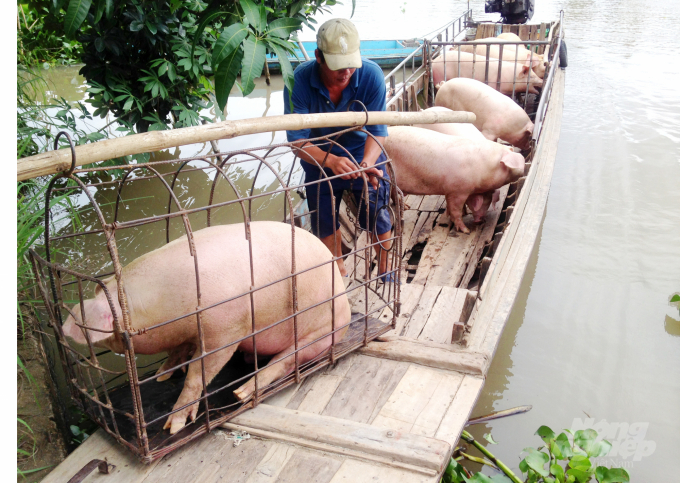
Traders buy pigs from households in the Mekong Delta. Photo: Le Hoang Vu.
Tien Giang province, with approximately 350,000 pig heads, is one of the Mekong Delta's biggest pig farming hubs. At the moment, the price of commercial live pigs has plummeted, putting many farmers in financial difficulty.
Mr. Nguyen Tan Binh's family in Thoi Son commune, My Tho city, has been thrust into a precarious position due to the unsellability of his pig farm with more than 120 pigs.
"At the moment, many markets have not started, and trade is modest. Breeders advocate for local governments to reopen local markets, enable employees to return to work, and students to return to school in order to expand possibilities for pig trade "Mr. Nguyen Tan Binh said.
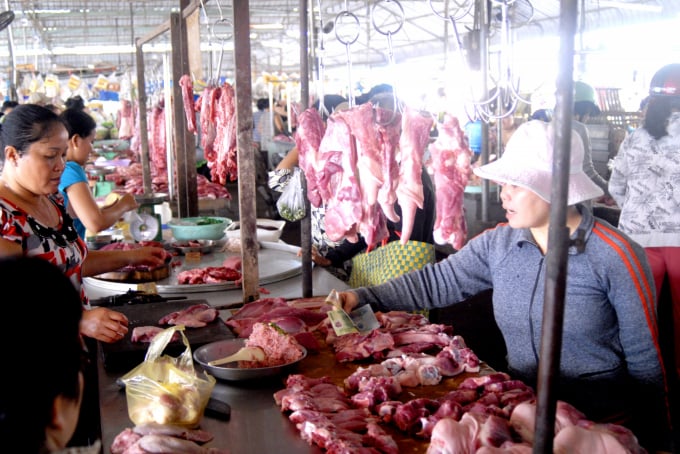
As the price of pigs is declining, many pig farmers in the Mekong Delta proposed to slaughter animals themselves and sell the meat in retail stores; nevertheless, the price will be higher than the price of live pigs. Photo: Le Hoang Vu.
Recently, African swine disease was eliminated in Can Tho, allowing people to re-herd pigs. At the moment, there are many herds of pigs for sale, resulting in an ample supply of live pigs and meat.
Additionally, as a result of the Covid-19 outbreak, consumption has become difficult, and many small companies have restricted their purchases of live pigs.
Since then, the number of live pigs has increased, farmers have had to spend more money on animal feeds, and losses have increased even more. Numerous pig farming households provide the option of self-slaughtering pigs for sale in retail marketplaces at rates ranging from VND 60,000 to 70,000 per kilogram.
Ben Tre province is one of the Mekong Delta's biggest producers of commercial pigs. Mr. Tran Quang Thai, Director of the Ben Tre Sub-Department of Livestock Production and Animal Health, stated: "At the moment, the province's pig herd is projected to number 410,000 heads.
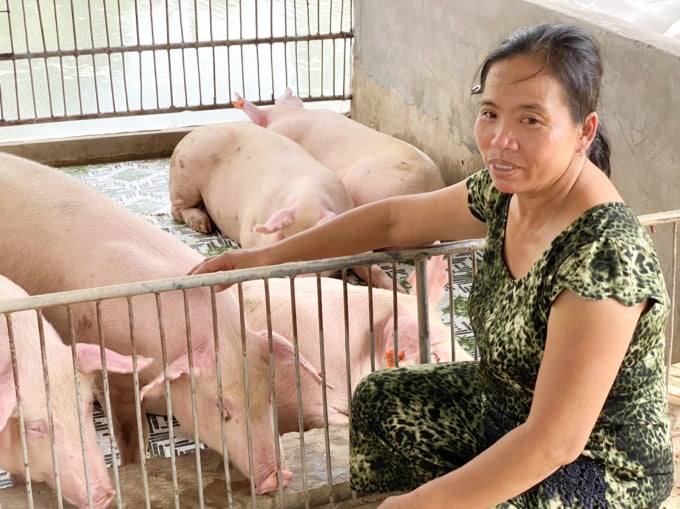
Facing the situation of pork prices falling sharply, the provinces in the Mekong Delta have not innitiated any policies to support farmers. Photo: Le Hoang Vu.
Due to low pig prices, farmers are experiencing difficulties. Numerous individuals are slaughtering pigs for sale in order to recoup money without going via merchants. At the moment, households are attempting to fight the situation and avoid being re-herded. Currently, the province lacks a policy aimed at assisting farmers. Additionally, I hope the government has measures in place to aid livestock recovery and boost domestic live hog prices."
According to Mr. Nguyen Van Dung, a farmer with the An Phuoc Biosafety Breeding Cooperative Group (Ben Tre province), the unit now has 18 farmers engaged in biosafety pig production. At the moment, farmers sell pigs for between VND 3.2 and 3.4 million per quintal, far below the cost of production. There are families who have lost at least VND 20 million, while those that grow a large number of pigs have lost hundreds of millions. Because the price of pigs is too low to sell, many individuals are forced to kill and sell in order to recoup their investment, but the more they raise, the greater their losses.
Mr. Tran Tien Hiep, Head of the An Giang Livestock Production and Animal Health Sub-Department, said that An Giang's pig population is now steady at over 58,000 heads. The task of maintaining safety and avoiding pig epidemics is still being carried out on a regular basis by the area. However, as a result of the Covid-19 pandemic's effect, consumption capacity fell, resulting in a fall in the price of pigs, posing problems for farmers. Additionally, the agriculture industry has taken many steps to assist farmers, including establishing connections and contacting merchants.
To address the issue, responsible authorities organize farmers to adopt risk-minimization measures in livestock, such as using appropriate breeding methods to prevent infections entering the farm, reducing breeding expenses, and establishing a chain of livestock production. Restructuring the livestock sector by identifying and directing the establishment of sustainable pig herds.
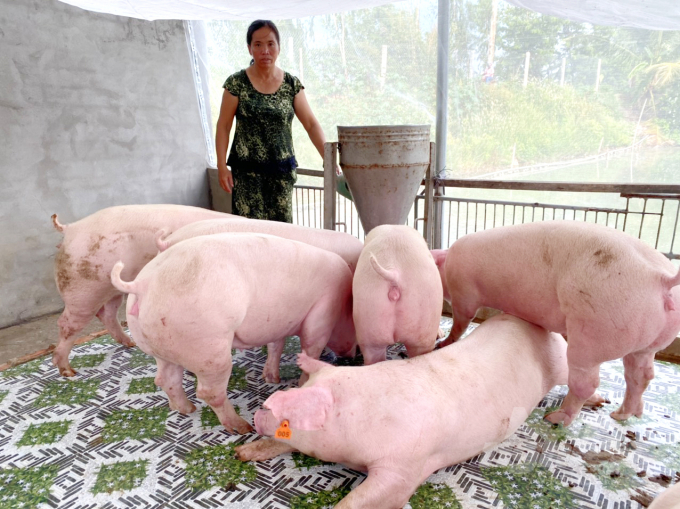
Farmers are expecting that in the last months of the year, the price of pigs will back to the upward trend, creating more profit for farmerst. Photo: Le Hoang Vu.
Additionally, the agriculture sector improves inter-sectoral cooperation at the border gate to conduct thorough inspections of transport vehicles and hand-carried items to prevent pigs and pig products from being smuggled. Simultaneously, educate and organize livestock families to actively protect their pigs from illness.
Mr. Doan Van Danh, Director of the Ben Tre province's Department of Agriculture and Rural Development, said that people's ability to expand their herds is restricted at the moment. Connecting is essential to boost local consumption and minimize frozen meat imports.
Additionally, promoting circulation throughout the Covid-19 era. Mr. Doan Van Danh also proposed that the Central Government establish a facility to buy, freeze, and process food during times of low costs and to maintain a balance during times of high prices.
Translated by Linh Linh

(VAN) On May 15, Ministry of Agriculture and Environment of Vietnam hosted the 'Connecting Vietnam - Germany agricultural, forestry and fishery trade' seminar in Berlin, Germany.

(VAN) In the face of counterfeit and imitation products, Khanh Hoa Salanganes Nest Company hopes for the prompt completion of the legal framework, strict enforcement against violations, and protection of the bird’s nest brand.

(VAN) Japan's efforts to lower the price of rice through the release of its stockpile may finally be making some progress, albeit at a snail's pace.

(VAN) U.S. tariffs are not only a 'shock', but also an opportunity for Vietnamese businesses to renew their mindset toward comprehensive development.

(VAN) As Bac Giang lychee enters the harvest season, Minister Do Duc Duy expects that the fruit will contribute greatly to agricultural exports due to standardized production and deep processing.

(VAN) Consumers have shown a preference for free-range eggs, but those farming systems are more vulnerable to biosecurity risks like bird flu.
/2025/05/09/5701-1-184335_301.jpg)
(VAN) Vietnam’s eel exports nearly doubled thanks to a mud-free farming model, opening up new prospects while still facing numerous barriers related to international standards.